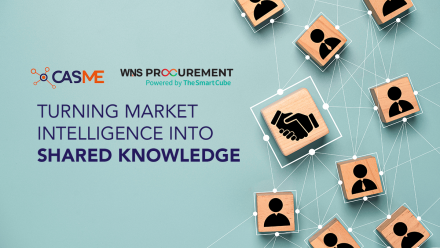
A webinar hosted by alliance partners The Hackett Group and CASME, has highlighted the difficulty in planning for the future - primarily due to uncertain global markets, including volatile supply chains, and ongoing macro geo-political risks.
During the event, attended by more than 120 procurement professionals from leading global brands, results from live benchmarking polls were compared with poll results from a previous event in June 2023, to gauge the biggest challenges faced by those working in the profession today.
Setting the scene, Nic Walden, Associate Principal - Procurement Advisory at the Hackett Group, presented the key macro-market trends from the company’s recent report, ‘Managing for Inflation’, and discussed how to prepare supply chains for the risks posed by these scenarios.
In the live benchmarking polls, 65% of those who voted are concerned about the impact of government elections and the potential changes to policies, regulations and tariffs on procurement and supply chains. This is followed by 49% who are aware of the potential for disruption in logistics and shipping, and 44% who are worried about the consequences of war, such as kinetic, cyber and information disruptions.
Live Poll: Which geopolitical risks and opportunities are you most concerned about for procurement and supply chains?
(Select your top 3)
Recent benchmarking, undertaken within the CASME procurement community, reveals labour shortages and rising costs to be the perceived highest risk areas; evidence that keeping costs under control is a primary objective.
Preparing for Uncertainty
As the external market landscape is unlike any other in recent memory, there are no models to predict how things might change. Key risk mitigation practices and recommendations from the discussions include:
- Scenario modelling: reviewing scenario modelling frameworks to pinpoint potential risks and opportunities for categories and contracts. Applying diverse scenarios to gauge possible impacts
- Focusing on priority categories: direct mitigation and negotiation efforts towards critical spend categories, using scenario analysis for informed, proactive decision-making
- Demanding transparency: insisting on comprehensive cost breakdowns from suppliers when they cite inflation. Rejecting price increases without clear justification
- Renegotiating contracts: challenging the status quo by renegotiating contracts for better terms instead of accepting price hikes. Using RFPs to ensure competitive pricing
- Monitoring supplier performance: regularly discussing supplier performance, considering the impacts of inflation and geopolitical events. Placing underperforming suppliers on corrective plans
- Mapping supply chain risks: identifying critical risks and potential failure points within the supply chain. Qualifying and engaging alternative suppliers to assess their capabilities
- Considering geopolitical factors: keeping events such as elections, wars, and shipping disruptions in scenario planning. Prioritising short-term strategies in response to these factors
- Exploring AI benefits: investigating the advantages of AI, being mindful of its limitations, especially concerning labour shortages. Prioritising tools such as chatbots and spend analytics.
Looking ahead to the next 12-24 months, 60% of the audience who voted think that geo-political shocks will continue; although only 8% of the audience believed that a deep V-shaped recession or ‘hard landing’ similar to the recessions of 2008 or 2020 is likely.
Vicky Kavan, from the Hackett Group’s Sourcing and Procurement Executive Advisory team, pointed out that when asking this question during their research reports over the last 3-4 years, respondents have generally been “a little more positive than what has actually panned out”, with the panel concluding that ‘cautious optimism’ is the prevailing mood.
Live Poll: Which scenarios do you consider more likely to happen in the next 12-14 months?
(Select all relevant answers)
A recording of the webinar ‘Going for Gold: Managing Market Pressures to Deliver Value’ is available to attendees. If you missed it and would like a copy of the recording and slides, please contact: carolyn.blake@casme.com
Back to News



